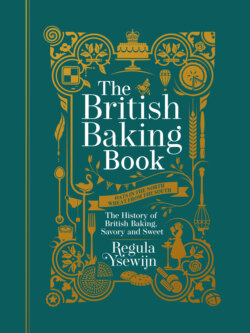Читать книгу The British Baking Book - Regula Ysewijn - Страница 8
На сайте Литреса книга снята с продажи.
Оглавление11
INTRODUCTION
A love story
Ever since I was little, I have been fascinated by Britain. The butterflies in my belly stirred when I heard a lullaby about England
at the age of five, painting a picture of an evergreen island, hills crowned with castles, prehistoric monuments, impressive queens,
brave knights, and mystical creatures. I wanted nothing more than to go there and live in a limestone cottage by a stream. My mother
and I made trips to the only English store in Belgium to pretend we were in London. We bought shortbread, placed it on an English
china plate, and ate it while watching historical dramas and documentaries on the BBC.
When I turned nine, my parents finally gave in to my greatest wish and we went to Britain. They had previously thought that the
childhood infatuation would fade, but it only grew stronger. We started to spend all our family vacations in Britain, and I looked
forward to them all year. When I couldn’t be there I spent my time with my nose in books about British history. The kings and
queens of England became like the characters of a novel, and a portrait of Elizabeth I hung above my bed as if she were Madonna.
A powerful woman, the Virgin Queen of England, my idol.
The anticipation for our trips to Britain started when my mother came home from the library with the travel guides. My parents
then spent the evenings hunched over the road map that covered the round dining table in our little flat in Antwerp. They marked
our trip with a neon highlighter – the routes to take and the things we had to see. When my parents were done, I took the map to
my room, jumped onto my bed, and ran my finger across the marked road, memorizing every town. I dreamed about castles, stone
circles, dramatic coastlines, and desolate moorland. I learned English from reading Jane Austen’s novels and did not miss a single
episode of EastEnders on the BBC. Some of my British friends have remarked in recent years that I was training to be British.
On our travels through England, Scotland, and Wales, I was constantly looking for regional bakes and local bakeries. I was quite
surprised that British bakeries were so small that they usually had only one window in an ordinary village house. I would press my
nose to the window to see which buns and cakes were on offer. I ate soup every afternoon because I knew it would come with the
advertised “warm soft white roll.” The roll came wrapped in a white napkin and was served with small packaged butters that quickly
softened from the warmth of the bread. Did you know that the British have more than seven local names for this generic white roll?
I wanted to taste them in all their forms. It was a time when every tearoom, pub, and cafe served homemade bread or rolls from the
local baker. It was the glorious ’90s, before Britain became obsessed with the “French baguette,” which was just a pale prebaked
shadow of the good stuff you get in France. A time in which the gastropub flourished and you could eat well and locally in almost
every pub that you passed. I experienced the renaissance of British food and saw how proud people were about their local produce.
Even then, notes were made on the menus to say the meat or fish was local. It was something I did not see in Belgium, where pride
in provenance and heritage was missing in everything.
The British also have a sense of humor when it comes to food. In addition to a rare-breed steak and potatoes from the island of
Jersey, or a fragrant chicken curry, the menus also offered pizza served with fries. I know that the latter may sound strange, but even
the Italians do it and I enjoyed it immensely as a child, just like fries with a topping of Cheddar cheese, a chip butty (sandwich), or
fish finger bap (roll). There must be a place for these types of dishes. It should certainly not be on the menu every week or month,
but sometimes you just need these simple dishes. Sometimes all you need is carbs.
I never ate much cake during our travels because we did not eat many sweet foods in our family. I experienced a traditional
afternoon tea only in my late teens when I traveled to Glastonbury, looking like a hippy. I still vividly remember my first muffin,
though. It was dense and moist, stained with blueberries and almost the size of my head. I bought it on a foggy summer’s day in a
small bakery near the port of Ullapool in the Highlands of Scotland. It took me two days to eat the thing. After every bite, I put it
neatly back in the brown paper bag in which the baker had wrapped it. I enjoyed every bite, picked the berries out and loved the
moist blue spots that they left behind. It was the most glorious thing ever. This was the moment that I realized I loved cake, and
when I got home, I started baking.
